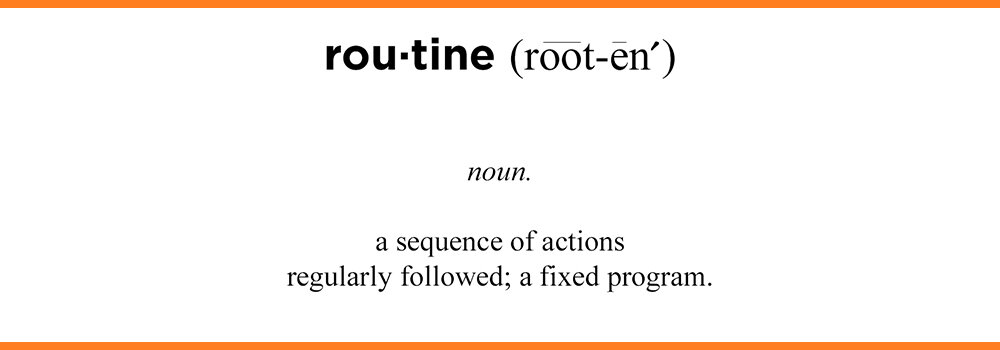
How do you prepare for the year ahead? Some rely on resolutions, while others set a series of ambitious goals. There is no wrong way to do it, but as scientists continue to study the subject of motivation and goal-setting we are getting a clearer picture of the best ways we can set ourselves up for success. For those who need a little inspiration I’m going to share some insights from a few of my favorite thought leaders.
GO BIG BY STARTING SMALL
Harvard Business Review is one of the most respected publications in the world, and each year around this time it seems like they have new information to share. At the beginning of 2020, they published a great article on the subject titled “To Achieve Big Goals, Start With Small Habits,” Sabina Nawaz shares her own experience in this area. For ambitious go-getters (any New Yorkers out there?) it’s sometimes difficult to to consider any other path. “As high achievers,” she says, “we’re programmed to go big or go home. But the data shows that big goals are often more burdensome than they are motivational; they require daunting effort to accomplish and sustain in our busy lives.”
Instead, she suggests, we should start with a “ridiculously small” micro habit like meditating for 30 seconds every afternoon, or drinking a big glass of water every morning right when we wake up. From there, build upon that success by setting a daily task to complete. This could be something as simple as reading one paragraph every day of the book you’ve been ignoring or just making your bed every day. Which is a great segue…
MAKE YOUR BED, THEN CHANGE THE WORLD
In 2014 US Navy Admiral, William H. McRaven, delivered a commencement speech at the University of Texas where he uttered the now-famous line, “If you want to change the world, start off by making your bed.” If you watch the speech — and I hope you do — you’ll hear a wave of laughter erupt from the crowd after he delivers the line. But he continues undaunted:
“If you make your bed every morning you will have accomplished the first task of the day. It will give you a small sense of pride, and it will encourage you to do another task and another and another. By the end of the day, that one task completed will have turned into many tasks completed. Making your bed will also reinforce the fact that little things in life matter. If you can’t do the little things right, you will never do the big things right. And, if by chance you have a miserable day, you will come home to a bed that is made — that you made — and a made bed gives you encouragement that tomorrow will be better.
If you want to change the world, start off by making your bed.”
That speech was also turned into a short book that makes for great January reading, and a perfect gift for graduates!
THE RIGHT AND WRONG WAY
On Episode 716 of the HBR IdeaCast (I told you I love the Harvard Business Review), the team featured an incredible interview with James Clear, the bestselling author of the book, Atomic Habits. He has three terrific ideas that I still can’t get out of my head since reading his book:
- Chunking – When faced with a complicated task, he suggests breaking it down into a series of smaller, simpler tasks.
- Pacing – Set a pace you can keep up with. If it’s your first time running the marathon, it’s probably not realistic for you to break three hours. (That would be a sub-7-minute mile for the entire 26 miles.) Instead, set a more attainable goal. Success is infectious. Hitting the goals you set for yourself will make you more apt to see things through to the end.
- Failing – We are going to slip up; it’s inevitable. Plan for it. Prepare for it. And figure out the best way to get yourself back on track. He suggests holding yourself to “never missing twice.” If you’ve set a goal of working out Monday through Friday every week, you can slip up once and still practice on Saturday or Sunday. But don’t let yourself miss twice in one week.
LEAVE SOME SPACE
Raise your hand if you’re the kind of person who tends to fill every minute of every day. Busy feels good, right? It makes us feel productive and important. But busy is also a trap. It can be a way of hiding from ourselves, and the things that are really important. Elizabeth Gilbert, bestselling author of Eat Pray Love, wrote another book a few years back called Big Magic. It’s all about the role of creativity in our lives, and surprisingly it has a lot to do with routines, habits, and how we set goals for ourselves. In that book, she talks a lot about time management. “I’m going to share a secret. It’s not about finding the time… it’s about making the time.”
If we’re not careful we can let ourselves get pulled in a million different directions based on everyone else’s priority list.
Unless…
We make a list of our own.
S.M.A.R.T GOALS
Peter Drucker was a celebrated author and management consultant who wrote extensively in the latter part of the 20th century. One of the things he’s most famous for is the acronym SMART. When setting any sort of goals, be it personal or professional, he says to make sure they adhere to the following criteria:
- Specific
- Measurable
- Attainable
- Relevant
- Time-Bound
A specific goal can be measured, and as Drucker also famously said: “What gets measured gets managed.” Make the goal attainable. As we pointed out earlier, small wins (like making your bed) make you hungry for more. Get yourself started on the right foot. Make sure the goal is relevant. If you want to lose some of the quarantine fifteen (mine is more like twenty, but whatever), then make sure you’re performing actions that will aide in your success. And finally, any successful goal must be time-bound… meaning, you have to give yourself a deadline.
January is always a time for setting new goals, and this year is no different. We’re watching as many of you are re-engaging with your practice, and using the upcoming challenge to help you do that. We couldn’t be more excited to see so many familiar names on that list. We hope this provides a little motivation to help you stick to your goals!





